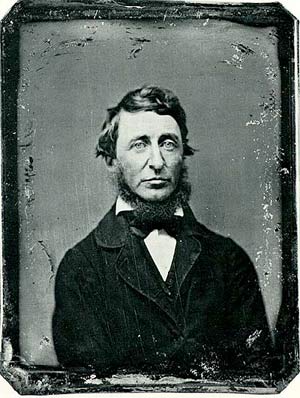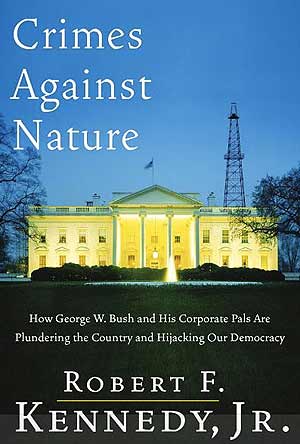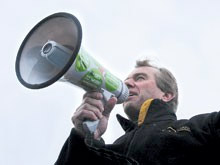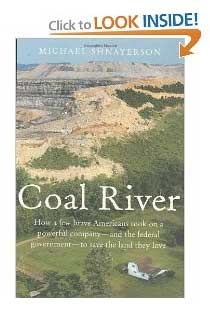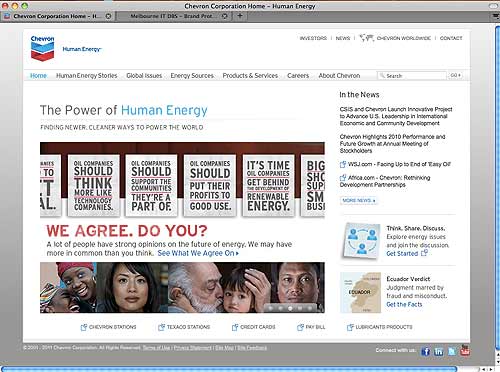Biblio
A Project in Cooperation with the Thoreau Society.
The Thoreau Reader - Annotated works of Henry David Thoreau
While Walden can be applied to almost anyone's life, "Civil Disobedience" is like a venerated architectural landmark: it is preserved and admired, and sometimes visited, but for most of us there are not many occasions when it can actually be used.
Still, although seldom mentioned without references to Gandhi or King, "Civil Disobedience" has more history than many suspect.
In the 1940's it was read by the Danish resistance, in the 1950's it was cherished by those who opposed McCarthyism, in the 1960's it was influential in the struggle against South African apartheid, and in the 1970's it was discovered by a new generation of anti-war activists. The lesson learned from all this experience is that Thoreau's ideas really do work, just as he imagined they would.
See: The Higher Law: Thoreau on Civil Disobedience and Reform by Henry David Thoreau, edited by Wendell Glick, with an introduction by Howard Zinn.
As a result of his writings and personal witness, we are the heirs of a legacy of creative protest. - Martin Luther King, Jr, Autobiography
This work is included in Fracking Resource Guide as an homage to the many individual voices and blogs I will continue to read that help the world stay informed about the dangers of hydrofracking.
I will join you at the barricades. Drilling isn't safe.
See: Essay by Peter Suber. "Civil Disobedience".
...The Nuremberg principles require disobedience to national laws or orders which violate international law, an overriding duty even in (perhaps especially in) a democracy.
Coalbed methane has rapidly become an important source of natural gas, particularly in the Inter-mountain West. The rapidity of its development has resulted in significant pressure on communities to deal with its environmental consequences.
Coalbed methane production often results in large quantities of water that are released as byproducts of production; in some cases, the water may inundate sensitive arid ecosystems, worsen surface water quality, and diminish undergroundwater supplies.
Noise, dust, and increased traffic; impairment of visibility and conflicts with recreation and other land use; impacts on wildlife and ecosystems; and other consequences of development have generated opposition in many communities.
Particularly vexing has been development on split estates, where surface owners do not own the mineral rights underneath their property and are required to cooperate with development that may disrupt the use and control of their land. This article examines the problems associated with coalbed methane development and offers a variety of suggestions for how conflicts could be reduced and how development could proceed in ways that are ecologically sustainable.
See: Hydraulic Fracturing Background Information | EPA (2004)
The Energy Policy Act passed by Congress in 2005 amended the Safe Drinking Water Act (SDWA) to exclude hydraulic fracturing fluids (except diesel fuel) related to energy production from regulation under the UIC program. States may choose to regulate hydraulic fracturing, however.
See: U.S. Environmental Protection Agency (EPA): Weston Wilson Whistle Blower Letter
See: Drilling Around the Law: Drinking Water Threatened by Toxic Natural Gas and Oil Drilling Chemicals
See: Hydraulic Fracturing of Oil and Gas Wells
See: Black Warrior Riverkeeper | Coalbed Methane
There are over four thousand coalbed methane wells in the Black Warrior River watershed. Tens of thousands of acres are leased to this practice, creating a massive network of roads and well pads. The extraction of coalbed methane involves a process known as hydraulic fracturing.
The Black River Watershed in Alabama provides water to over a million people.
See: Orion Magazine. November/December 2006. Taking On Goliath: Across the West, gas development is devastating land and people. | Now citizens are fighting back.
In this powerful and far-reaching indictment of George W. Bush's White House, Robert F. Kennedy, Jr., the country's most prominent environmental attorney, charges that this administration has taken corporate cronyism to such unprecedented heights that it now threatens our health, our national security, and democracy as we know it... --from the book jacket.
Robert Kennedy Jr. says we the people have the right to protect our commons.
Photo by Shadia Fayne WoodSee: Sarah van Gelder. Yes Magazine. May 27, 2010. "Protecting our Water Commons: Interview with Robert Kennedy Jr."
van Gelder: How important is the public trust doctrine in enforcing the idea that the waters are a commons and that ordinary people have a right to it?
Kennedy: There are two ancient laws that underlie all modern environmental laws: One is the nuisance doctrine that essentially says you can use your property any way you want, but if you pollute and it escapes your property and goes onto somebody else’s property, you’re violating the law.
The other is the public trust doctrine, which says you can’t do anything that is going to diminish the commons, which includes any property that is not susceptible to private property ownership, like air, water, the fisheries, wetlands, wildlife, the wandering animals, rivers, streams, shorelines, aquifers, underground rivers, etc. Everybody has the right to use the commons, but nobody can use them in a way that diminishes their use and enjoyment by others.
This is ancient law that goes back to Roman times when every citizen—rich or poor, humble or noble, African or European—had a right to cross the beach, throw in a net, and take out a share of the fish. And the emperor himself couldn’t stop them.
The first thing that happens in a tyranny is the privatization of the public trust by powerful entities...
See: Flow - The War Between Public Health and Private Interests
See: Robert F. Kennedy Jr. Feb. 19, 2004. The Nation. "The Junk Science of George W. Bush".
See: Robert F. Kennedy, Jr. Mobilizes on Mountaintop Removal
See: Mountaintop Removal Redux: Bobby vs. Blankenship II
See: New Starpower in the Fracking Fight
See Also:
Barlow, Maude. 2009. Blue Covenant: The Global Water Crisis and the Coming Battle for the Right to Water. The New Press, June 1.
Ivins, Molly. 2003. Bushwhacked : Life in George W. Bush's America. 1st ed. New York: Random House.
Shnayerson, Michael. 2008. Coal River. 1st ed. Farrar, Straus and Giroux, January 8.
This video shows a Grandfather changing the water filter on his well water in Prenter, WV. Coal Waste has been injected into abandoned underground mines near his house. See sludgesafety.org for more info on coal slurry.
Hydrofracking involves storing gas underground and disposing of fracking sludge in abandoned mines, both a potential threat to groundwater.
See Aurora Lights article on Coal Mining's effect on clean water in West Virginia.
Climate change issues bring into greater prominence that all the world's people are linked together and that we all have a stake in creating a sustainable path for the planet and no such path can allow for 10 million avoidable child deaths each year.
--Kirk Smith, UC Berkeley, School of Public Health
Whatever your goal (economic growth, stable population democratic institutions, global equity, art, literature, science, an educated electorate, etc.), it is impaired by excess child mortality.
Malnutrition is the single most important risk factor for child mortality. According to Kirk Smith, "each of [its'] separate causes is thought to be increased by both climate change itself and, potentially, by efforts to combat climate change through biofuel expansion [and] energy price rises."
Professor Smith’s research addresses the relationships among environmental quality, health, resource use, development, and policy in developing countries, and the implications for policy of the potential to achieve co-benefits (health and climate) from pollution control in developing countries.
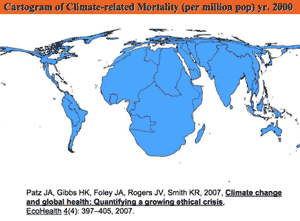
"One of the few positive sides of the climate change crisis is that the global village is no longer just an intellectual construct.
That we have one planet, one atmosphere, one set of mutual responsibilities, and one fate – these are now clear."
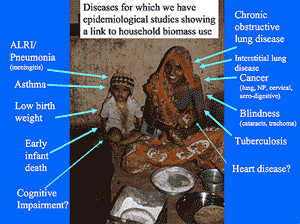
Thank you Professor Smith. I ask, what is the value of a human life? Climate change is going to kill millions of children, does it matter that they're not yours?
The value of a life in the United States is a factor in the quality of regulation and enforcement of the Clean Air Act, the Clean Water Act, and climate change policy initiatives that may not survive the Climate Zombies of the U.S. Congress.
As Washington and our insurance companies estimate an individual life's value at around 4 to 6 million dollars, the warrant for increased regulation of toxic industry seems more justified. Yet, the oil and gas industry and their government advocates still question the legal authority of the EPA and U.S. congress to enact and enforce environmental regulations as they relate to both climate change and the enormous consumption of water associated with hydraulic fracturing.
There are sociological and economic impacts of an unregulated energy industry. A tightly connected global ecosystem depends more and more on both a food and water supply that has become more privatized, making it difficult for self-sustaining indigenous farming to succeed.
One week's worth of food by various cultures:
Hundreds of millions of children are slated to die already, mostly by starvation, because of our present inaction.
The oil and gas industry has shown no evidence that it is ready or capable of self-regulation. It becomes an increasing threat to the health of humanity. (Neil Zusman. 2011-02-24)
"The exploitation of fossil fuels is integral to modern living and has been a key element of the rapid technological, social, and cultural changes of the past 250 years. Although such changes have brought undeniable benefits, this exploitation has contributed to a burden of illness through pollution of local and regional environments, and is the dominant cause of climate change.
This pattern of development is therefore unsustainable at a global level. At the same time, about 2·4 billion of the world’s population, disadvantaged by lack of access to clean energy, are exposed to high levels of indoor air pollutants from the inefficient burning of biomass fuels." (Wilkinson, 2007).
Smith, K. R, and E. Haigler. “Co-benefits of climate mitigation and health protection in energy systems: scoping methods.” Public Health 29 (2008): n. pag. Print.
Smith K.R., "Mitigating, Adapting, and Suffering: How Much of Each?", (Symposium on Climate and Health, KR Smith, ed), Annual Review of Public Health 29 (2008): 23. Print.
Wilkinson, Paul. et al. “A global perspective on energy: health effects and injustices.” The Lancet 370.9591 (2007): 965-978. Web.
See: Appelbaum, Binyamin. “A Life’s Value May Depend on the Agency, but It’s Rising.” The New York Times 16 Feb. 2011. Web. 17 Feb. 2011.
See also: Associated Press. "How to value life? EPA devalues its estimate: $900,000 taken off in what critics say is way to weaken pollution rules." 2008-07-10.
From Publishers Weekly
Through vivid first-person reporting and a thorough culling of court transcripts, newspaper clippings and corporate reports, Vanity Fair contributing editor Shnayerson (The Killers Within) has crafted an incriminating indictment of the Appalachian King Coal industry in West Virginia, and of the man he defines as its rapacious kingpin, Massey Energy's CEO, Don Blankenship.
The author's sympathies lie clearly with opponents of mountaintop mining, most prominently young attorney Joe Lovett and citizen activist Judy Bonds. Both have fought against a form of mining that shears off the tops of hills and dumps rubble into valleys and streams—a process abetted by the collusion of the state's often-lackadaisical Department of Environmental Protection, the U.S. Army Corps of Engineers' propensity to grant stream-destroying permits without oversight and the easing of environmental controls by the Bush administration.
Shnayerson's compelling take on toxic mining methods and their heartrending impact on Appalachian inhabitants and their culture, has a wider focus than Erik Reece's 2006 title, Lost Mountain, which reported on one mountaintop's destruction, and strong echoes of the stomach-churning legal machinations recounted in Jonathan Harr's 1995 bestseller, A Civil Action.
See: Michael Shnayerson web page.
See: Marsh Fork Elementary: Journey Up Coal River | A Community and Strip Mining
See: WATER | Aurora Lights. Public Health & Coal Slurry - Water Quality ::: Journey Up Coal River
See: Tree spiker : from Earth First! to lowbagging: my struggles in radical environmental action
See: Leveling Appalachia: The Legacy of Mountaintop Removal Mining
See: Environmental Issues and Challenges in Coal Bed Methane Production
See: Climate Ground Zero
See: Mountaintop Removal
This video shows Texas Black Angus cattle drinking from drilling sludge pits at two different drilling sites in Denton County. I have witnessed cattle drinking from sludge pits regularly over the past few years.
Unlike most other states, Texas law does not require that sludge pits be lined or fenced, but it does require the pits be "cleaned up" within 120 days after completion of the well.
There are many sludge pits in Texas that never get cleaned up. These are a threat to wildlife, livestock, soil and our drinking water.
See Bluedaze by Sharon Wilson (TXSharon)
Chesapeake Energy breaks another promise. In meetings with Fort Worth, Texas residents, Chesapeake promised Fort they wouldn't flare the Barnett Shale gas wells in the Trinity Trees area.
See: Bluedaze by Sharon Wilson (TXSharon). December 6, 2010. "Chesapeake Energy uses fear to divide communities and pit neighbor against neighbor".
See: Poison Fire.
At Chevron, our businesses work in concert to provide the energy that drives human progress. Explore Chevron’s companies to learn how we use our global resources, determination and ingenuity to meet today’s complex energy challenges.
According to the EPA's National Emission Inventory, Chevron was responsible for 4,030,422.95 pounds of green house gas emission pollution in Plaquemines Parish, Louisiana in 2002.
Chevron was the first international oil company to operate in Nigeria and has, for almost 40 years of operations there, practiced the wasteful process of burning off of gas associated with oil drilling. [1]
Exxon Mobil Corp., ConocoPhillips, Chevron Corp. and Royal Dutch Shell Plc are as ill-prepared as BP Plc to halt and clean up an offshore oil spill because they all use “carbon copy” disaster plans, lawmakers said.
“The oil company response plans are great for public relations but these plans are virtually worthless in the event of a spill,” said Representative Bart T. Stupak, a Michigan Democrat. “It could be said that BP is the one bad apple in the bunch, but unfortunately, they appear to have plenty of company.” [2]
[1] Friends of the Earth. “The Case of Chevron.” Friends of the Earth, 2011. http://action.foe.org/content.jsp?key=3493.
[2] Jim Efstathiou Jr. and Joe Carroll. Jun 15, 2010. "Exxon, Others Slammed for Carbon-Copy Oil-Spill Plans". Bloomberg News.
A Satirical Tale of Two Chevrons
The Power of Chevron (2009)
Chevron is working to reduce greenhouse gas (GHG) emissions while expanding its energy supply portfolio to meet the world's energy needs.
Chevron climate change advisor Arthur Lee is an expert in carbon capture and storage. He has participated in industry workshops and the Intergovernmental Panel on Climate Change's (IPCC) Report on Carbon Dioxide Capture and Storage.
The Power of Chevron's Human Energy (2008)
The Power of Chevron's Human Energy (2008)
Video mashup by Jonathan Mcintosh | rebelliouspixels.com.
This is an identity correction remix that turns Chevron's multi-million dollar Human Energy greenwashing PR blitz on its head.
Though the video targets Chevron Oil and their Orwellian "Human Energy" campaign, it also focuses more broadly on corporate control of global oil supplies and the connection to aggressive American foreign policy.
In this corrected commercial the company's true nature is exposed for what it is, a heartless profit-driven oil machine. The Chevron corporation is not only an ecological catastrophe around the world but still does business with the Burma dictatorship, has oil contracts in war-torn Iraq and is responsible for human rights atrocities in the Niger Delta, among other unpleasant and nasty things.
This Political Remix Video is a critical and transformative work that constitutes a Fair Use in accordance with Title 17 U.S.C. Section 107. Source footage from Chevron TV ads, US Army ad, BBC News, Future Weapons, CSI and several other short clips recorded off television.
See: About Jonathan McIntosh | Rebellious Pixels - Digital Home of Jonathan McIntosh
Update:
Date: Mon, 06 Jun 2011 21:52:53 -0400
From: neil zusman <zusman@earthlink.net>
To: ChevronBPS <ChevronBPS@melbourneitdbs.com>
Subject: Re: Unauthorized Chevron Logo usage in your site - (http://frack.mixplex.com/content/chevron-corporation-human-energy)
- 1st Notice
On 6/6/11 5:31 PM, ChevronBPS wrote:
> Melbourne IT DBS Inc.
A recent review of your web site
*(http://frack.mixplex.com/content/chevron-corporation-human-energy)* indicated
that you are using one of Chevron's registered trademarks.
Chevron does not allow such use of its trademarks without express
written permission. We are advised that Chevron has no record of
such permission being granted.
If permission was granted from Chevron, please forward a copy of the
permission letter to Chevronbps@melbourneitdbs.com for their files.
If you did not receive permission from Chevron to post the logo on
your web site above, please remove the logo from your web site and
from all other locations where it is being used.
Thank you for your interest in my website. The piece needed editing.
As Chevron has requested, I removed the logo you are inquiring about and
replaced it with a screen shot of Chevron's website to ensure my
readers the clarity of context. The analysis of media and corporate
responsibility by energy sector companies are important to me. If you
wish to consider this matter further, I look forward to discussing your
concerns about Chevron's trademark rights in my representation of
Chevron as well as my Fair Use rights under Title 17 U.S.C. Section 107.
I welcome a productive and healthy relationship with Chevron and its
subsidiaries in the consideration of environmental issues and prudent
government regulation and trust that our covenant with the Earth will be
of mutual benefit.
Sincerely,
Neil Zusman
Fracking Resource Guide
See: News Updates on Chevron. 2011-06-06.
See: The Case of Chevron
See: BP Deepwater Horizon Committee Hears From Oil Industry Executives. 9-26-2010.
See: Poison Fire
See: Rancho Los Malulos | A satirical view from the McGill Brothers Lease
See: Natural gas: the commodity world’s ugly duckling
See: Controversial gas 'fracking' extraction headed to Europe
See: As You Sow - Corporate Accountability, Shareholder Action, and ToxicsReduction
See: The Yes Men | Climate Pledge of Resistance
See: Heather Clancy. "Shareholder flack flies over fracking". SmartPlanet. June 3, 2011.
The coining of the term eco-terrorism is credited by many to the Executive Director of the Center for the Defense of Free Enterprise, Ron Arnold.
In the aftermath of the September 11 terrorist attacks, the word 'terrorism' has become a potent political weapon. For years Arnold has blurred the boundaries between what constitutes civil disobedience and elevated vandalism to equal terrorism. The conflation of civil disobedience with terrorism is a calculated strategy.
Legislation using the cover of cracking down on 'eco-terrorism' - such as that currently being promoted by the American Legislative Exchange Council - is percolating its way through the legislatures of a number of U.S. states. While vandalism and criminal damage is already illegal, the attraction of such legislation is in defining "terrorism" so broadly as to ban civil disobedience.
One of the most potent tactics employed over the last twenty years in the environment movement has been through organising peaceful civil disobedience protests. Such protests often result in an issue gaining widespread media coverage prompting public discussion of important public issues and, in some cases, resulted in environmental victories.
Groups that have a high media profile also have the ability to successfully raise funds from appeals directly to millions of citizens. For the conservative movement, legislating against civil disobedience under the guise of cracking down on 'ecoterrorism' would dramatically reduce both the media profile and fundraising capacity of groups such as Greenpeace, the Rainforest Action Network and local grassroots groups.
Please note that information taken from Wikis should be verified using other, more reliable sources. It is a good place to start research, but because anyone can edit a Wiki, we do not recommend using it in research papers or to obtain highly reliable information.
Cabot Oil & Gas Corporation, headquartered in Houston, Texas, is a leading independent North American natural gas producer. The company’s reserves are focused in both conventional and unconventional basins in Appalachia, the Rocky Mountains, the Mid-Continent and the Gulf Coast.
See: Cabot Oil & Gas’s Marcellus Drilling to Slow After PA Environment Officials Order Wells Closed. Lustgarten, Abrahm. ProPublica. (2010).
See: Commonwealth of Pennsylvania DEP takes aggressive enforcement action against Cabot Oil
See: Associated Press. December 16, 2010. The Wilkes-Barre Times Leader. "Gas driller to pay $4.1 million in settlement."
HARRISBURG — The state Department of Environmental Protection has abandoned its plan to force a Houston-based drilling company to pay nearly $12 million to extend a public water line to residents whose wells have been contaminated with methane gas, citing a lack of political support.
Environmental regulators say Cabot Oil & Gas Corp. instead will pay residents of Dimock a total of $4.1 million under a settlement with the company announced late Wednesday. Cabot also has agreed to pay to install whole-house gas mitigation systems in each of the 19 affected homes.
The settlement infuriated residents, who say the DEP caved to political pressure.
See also:
- Legere. Hazards posed by natural gas drilling are not limited to below ground
- Legere. Cabot and DEP clash over Dimock water contamination
- Lippert. Shale Gas Costing 2/3 Less Than OPEC Oil Incites Water Concern
- Lustgarten. Frack Fluid Spill in Dimock Contaminates Stream, Killing Fish.
- Lustgarten. Pennsylvania Orders Cabot Oil and Gas to Stop Fracturing in Troubled County
- McFerrin. Fight Over Gas Wells in Chief Logan Heads to Supreme Court
- Noell. Natural Gas Drilling Threatens Communities in Northeastern United States
- Piette. Water All Around … Or is There?
by Abrahm Lustgarten, ProPublica - April 16, 2010.
More than 15 months after natural gas drilling contaminated drinking water in Dimock, Pa., state officials are ordering the company responsible -- Houston-based Cabot Oil and Gas -- to permanently shut down some of its wells, pay nearly a quarter million dollars in fines, and permanently provide drinking water to 14 affected families.
The order is among the most punitive in Pennsylvania's history and reflects officials' frustrations over a string of drilling-related accidents. The record of spills, leaks and water contamination in Pennsylvania -- several of which are tied to Cabot -- has spotlighted the environmental risks of drilling for natural gas across the country, jeopardized development of the massive Marcellus Shale resource deposit, and contributed significantly to actions by both Congress and the U.S. Environmental Protection Agency to bolster federal oversight of drilling.
"The events at Dimock have been the black eye for the industry and have also been a black eye for Pennsylvania," the state's chief environment official, John Hanger, told ProPublica. "It's been an enormous headache. If Cabot doesn't get this message, the company has got an amazing hearing problem."
CalFrac is one of the companies the U.S. House Committee on Energy and Commerce is investigating on the potential environmental impacts from hydraulic fracturing.
"Hydraulic fracturing operations are constantly improving through advances in technology, which are intended to translate into cost savings and enhanced production for Calfrac’s customers."
In the 1970s, Congress passed a host of environmental laws that sought to adopt a preventive approach to reducing disease and protecting health and environment. Since then, average body burdens of some persistent toxic materials such as lead and cadmium have fallen, but those of other newer materials, like persistent flame retardants, have risen.
The major obstacle to a protective chemicals management system remains the culture of trade secrecy that allows firms to withhold information about potential health and safety dangers of their products. In my book, The Secret History of the War on Cancer, and in recent testimony to the President’s Cancer Panel on cancer prevention, I have advanced the concept of a Truth and Reconciliation Commission on Toxic Hazards.
The current regulatory system has failed to protect workers, their families and communities. Under the present adversarial system, companies can legally withhold information on the dangers of workplace hazards under the rubric of trade secrets, and they can also legally conceal information on health hazards as part of sealed settlement agreements...
Author's note: This essay is in response to: What is the key obstacle to implementing an effective, health-protective, chemicals management system?
See: Sandra Steingraber. Living Downstream: An Ecologist's Personal Investigation of Cancer and the Environment
See: Marcellus-Shale.us. "Our Look at the The Halliburton Loophole":
This exemption (from the Clean Water Act - authorized by the Energy Policy Act of 2005) allows non-disclosure of the toxic ingredients used near wells and aquifiers in drilling and waste injection. The rush to exploit the Marcellus Shale (referred to by BP's Tony Heyward as a "game-changer") allows gas drillers to legally keep secret the contents of the fracturing fluids used in fracking. Endocrinologist Dr. Adam Law of Ithaca, New York recently testified at the EPA Hearings in Binghamton that doctors cannot treat patients for exposure to chemicals if they don't know what they were exposed to. TEDX, The Endocrine Disruption Exchange, directed by Dr. Theo Colborn in Colorado continues to investigate the relationship between health and environmental distress.
See: Poisoned profits : the toxic assault on our children
See: Tox Town
See: The National Children's Study (2010)
The National Children’s Study will examine the effects of the environment, as broadly defined to include factors such as air, water, diet, sound, family dynamics, community and cultural influences, and genetics on the growth, development, and health of children across the United States, following them from before birth until age 21 years. The goal of the Study is to improve the health and well-being of children and contribute to understanding the role various factors have on health and disease. Findings from the Study will be made available as the research progresses, making potential benefits known to the public as soon as possible.
See:Fracking: Implications for Human and Environmental Health






